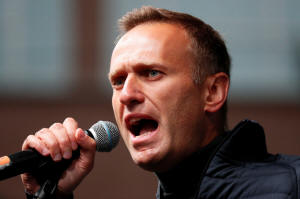Western countries call on Russia at UN rights body to release Navalny
 Send a link to a friend
Send a link to a friend
 [March 12, 2021]
GENEVA (Reuters) - Dozens of
countries including the United States called on Russia on Friday to
release Kremlin critic Alexei Navalny saying his imprisonment was
unlawful and demanding an investigation into his poisoning last year. [March 12, 2021]
GENEVA (Reuters) - Dozens of
countries including the United States called on Russia on Friday to
release Kremlin critic Alexei Navalny saying his imprisonment was
unlawful and demanding an investigation into his poisoning last year.
In a statement read out by Poland to the U.N. Human Rights Council in
Geneva, they said that actions by Russian authorities against the
opposition leader were "unacceptable and politically motivated". The 45
countries were mainly European but also included Australia, Canada and
Japan.
Navalny, a prominent critic of President Vladimir Putin, was jailed for
two and a half years last month over alleged parole violations related
to an embezzlement case he said was trumped up for political reasons,
something the authorities deny.
"We call on the Russian Federation for the immediate and unconditional
release of Mr Navalny and of all those unlawfully or arbitrarily
detained, including for exercising their rights to freedom of peaceful
assembly and association, freedom of opinion and expression, and freedom
of religion or belief," the joint statement said.

"We are also concerned by the large number of arbitrary arrests of
protesters who were expressing their support for Mr Navalny in many
Russian cities," the statement added.
Russia has previously described such criticism as interference in its
internal affairs.
[to top of second column]
|

Russian opposition leader Alexei Navalny delivers a speech during a
rally to demand the release of jailed protesters, who were detained
during opposition demonstrations for fair elections, in Moscow,
Russia September 29, 2019. REUTERS/Shamil Zhumatov

Britain's ambassador, Julian Braithwaite, said it was "disgraceful"
that Navalny, who was poisoned last year with what Western countries
say was a military-grade nerve agent, had been jailed while the
poisoning was not investigated.
On Friday, Navalny's lawyers said he had been moved from a jail in
Russia's Vladimir region and his whereabouts were unknown.
U.N. human rights experts said on March 1 that Russia was to blame
for the attempt to kill Navalny, and called for an international
investigation into his poisoning. Moscow denies poisoning Navalny
and says it has seen no evidence.
"Today’s statement should be just the start of greater Council
scrutiny and action to end the crackdown," John Fisher of New
York-based Human Rights Watch said.
The United States and European Union have imposed sanctions on
Russian individuals and entities over the Navalny case. The Kremlin
called the moves absurd, unjustified and void of any real impact.
(Reporting by Stephanie Nebehay; editing by Philippa Fletcher)
[© 2021 Thomson Reuters. All rights
reserved.] Copyright 2021 Reuters. All rights reserved. This material may not be published,
broadcast, rewritten or redistributed.
Thompson Reuters is solely responsible for this content. |